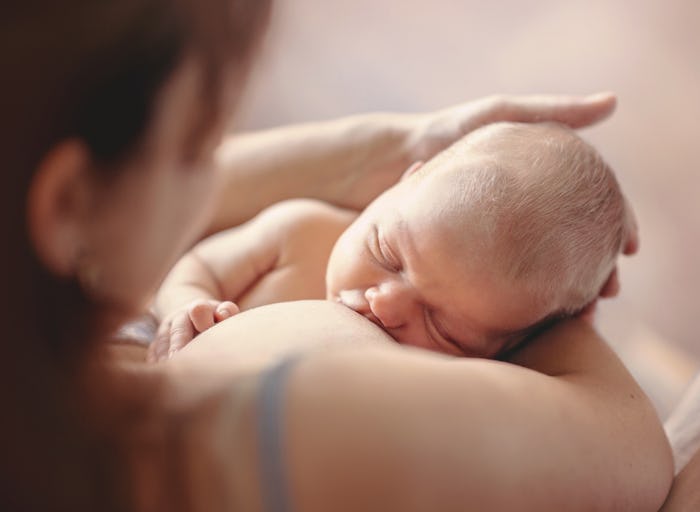Life

What You Need To Know About Breastfeeding & PPD, According To Science
It's true that breastfeeding and breast milk have many health benefits for moms and babies, including lower cancer risks for mom, and immunity support, allergy prevention, and possible brain boosts for your little one. But, can breastfeeding help mothers' mental health as well? Can breastfeeding help with postpartum depression? The idea is definitely interesting (and hopeful), but how much merit does it hold?
According to a study published in the International Journal of Psychiatry in Medicine (IJPM), mothers who were breastfeeding at 2 months and 4 months postpartum were less likely to be diagnosed with postpartum depression (PPD) at 4 months. The study stated, "The results indicate that women who breastfeed their infants reduced their risk of developing PPD, with effects being maintained over the first 4 months postpartum."
Another study published in Maternal and Child Health (MCH) found similar results. The study explored the postpartum states of nearly 14,000 women in England and found that there was a 50 percent reduction in the risk of PPD if the woman was breastfeeding. The reason for this, according to a BBC report on the study, could be that breastfeeding can help to relax mothers and reduce stress, which in turn, may prevent mental health issues from developing.
But, both research groups also found interestingly contradictory results within their studies.
The IJPM study noted that if mothers were diagnosed with PPD at 2 months, they were much less likely to still be breastfeeding their babies at 4 months postpartum; this suggests that PPD can directly influence whether or not mothers continue to nurse.
The MCH study noted something equally as surprising. Researchers found that if mothers had the intention of breastfeeding their child, but were unable to, they had more than double the risk of being diagnosed with PPD.
This is important information to consider, reported BBC: "It is right to tell mothers it's right to breastfeed, but the thing we need to rethink is giving more support to those who did want to breastfeed and to recognize those who are unable to are at substantially elevated risk."
Dr. Terry Grogg, MD, OB-GYN, confirms the duality of the breastfeeding and PPD relationship, telling Romper, "Some say the bonding experience with breastfeeding can help with postpartum depression, as the skin contact and bonding is good for both mother and child. However, if there are difficulties with the feeding process, it can also be a source of anxiety, and provoke depression."
Breastfeeding is not as easy as often as it's made to be. And though there are proven benefits to nursing, for both moms and babies, it's important to support those who with PPD, whether or not they're breastfeeding. Nursing your baby isn't an easy fix if you're suffering.
If you have a friend in this sort of situation, make sure to keep an eye on her — talk to her, ask her if you can help, and make sure she knows that whether breastfeeding helps her or not, it's not necessary to put pressure on herself. And, if you're in this situation, be sure to check in with your doctor to ensure your overall mental and physical health. Don't let breastfeeding be a fight — there are more important things to worry about.